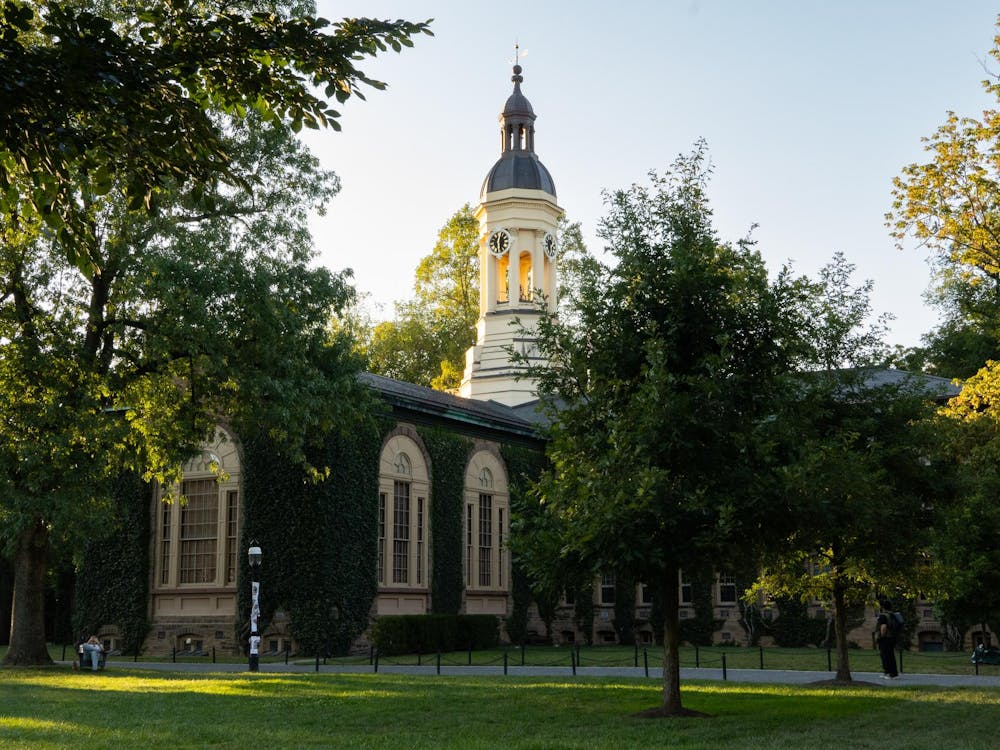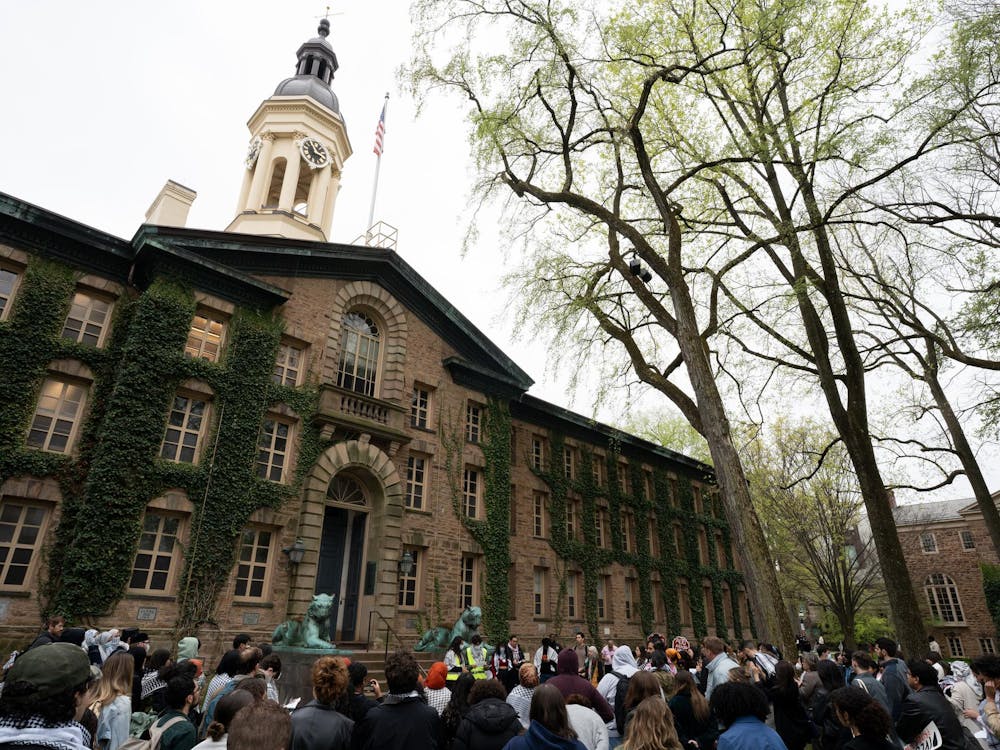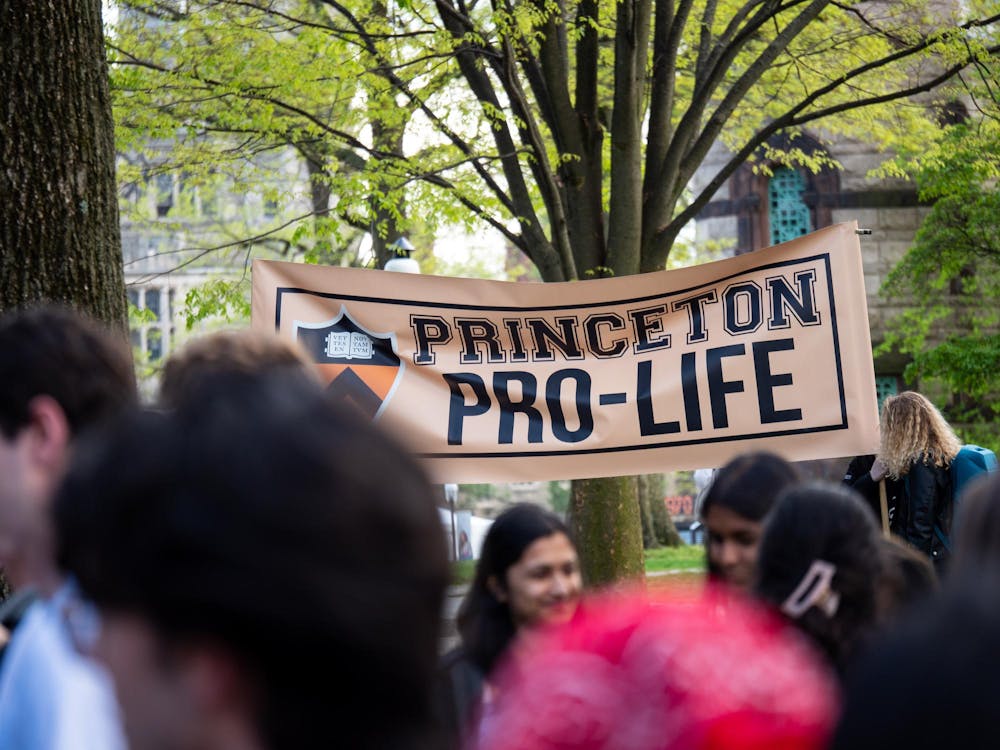In a critique of The New York Times' new motto “The truth is more important now than ever,” Tim Carney pushes back against the assertion that the truth matters now more than it did from January 2009 to January 2017. “In other words, the truth matters less before Donald Trump was president,” Carney said, noting that he was being “very semantic.”
In an event co-sponsored by the Princeton Progressive, Princeton Tory, and the American Whig-Cliosophic Society, Carney, an editor at the Washington Examiner, delivered a lecture and answered questions for around 25 students in Whig Hall. While nearly every seat was filled, only three women were in attendance. Carney is a visiting fellow at the American Enterprise Institute and the author of "The Big Ripoff: How Big Business and Big Government Steal Your Money" as well as "Obamanomics."
“This means we have to dig up the truth now because we have a president more detached from the truth than before,” Carney explained regarding his Times remark.
“This isn’t totally off base,” he added in regards to Trump’s rhetoric.
“The normal way politicians lie and mislead — I think Donald trump goes a little beyond that,” Carney said. “All of those reasons are true to some extent; he cares less about speaking the truth.”
“Politicians, as a class, care less about speaking the truth than a normal person,” Carney explained. “But it’s hard not to look at what’s happened as a sort of awakening of the press.”
To explain, Carney told the story of former President Barack Obama’s first State of the Union address. In his speech, Carney said that Obama stated that he would be excluding lobbyists from policy-making jobs.
In his speech transcript, Obama said, “That's what I came to Washington to do. That's why, for the first time in history, my administration posts our White House visitors online. That's why we've excluded lobbyists from policy-making jobs or seats on federal boards and commissions.”
“But we can't stop there,” Obama said in the address. “It's time to require lobbyists to disclose each contact they make on behalf of a client with my administration or with Congress. It's time to put strict limits on the contributions that lobbyists give to candidates for federal office.”
Carney, who was at the time writing about lobbyists, said he spent the rest of the address looking up how many lobbyists the administration had already hired. By the end of Obama’s administration, Carney explained that Obama had hired hundreds of lobbyists for policy-making positions. Carney said he preceded to call the White House and ask why they said they have excluded lobbyists from policy-making jobs when in reality the administration had hired some lobbyists.
“They said, ‘We can give you a list of many lobbyists we have excluded from policy-making jobs,’” Carney said. “They implied ‘some’ in that sentence, but basically Obama was lying to us. His sort of typical-politician adherence towards ... the truth so that there’s on interpretation close to the truth.”
Carney added that he then wrote a series of pieces about the lobbyists the Obama administration hired. He explained that The New York Times covered it differently, writing that this remark was made “in the context of addressing this deficit of trust, Obama said,” and that Obama issued an executive order that made it harder for lobbyists to land these jobs.

Carney said that in the past journalists have tried to present both sides of an issue in order to be unbiased.
“Liberals are the best to point out when this is done really dumbly,” Carney said, describing the typical example of climate change where a climate skeptic and an anthropogenic climate change scientist are presented as both sides of the argument.
“This is a faulty way to conduct journalism,” Carney said. “This is a relativistic point of view.”
Carney also noted that The Washington Post changed its motto the same week as the Times to “Democracy dies in darkness.”
“I think The New York Times and The Washington Post generally came from a poor understanding of their job to a better understanding of their job,” Carney said. “They were largely asleep for eight years and they went from being asleep to suddenly swinging the bat around like a maniac.”
“It went from an over-slumbering press to an over-frantic press,” Carney said. “A press so sure that we would have an authoritarian president that they’re willing to swing the bat around.”
Carney used the metaphor of the boy who cried wolf to explain what the media is doing.
“The boy is the press, it’s us, the villagers are the rest of the country,” Carney said. “If they start crying authoritarianism, then when it actually happens — and it might happen with Trump — [the public] won’t respond.”
Carney went on to criticize Trump’s travel ban, calling it “a horrible abuse of power, not even in a malicious way, but a sloppy way.”
He said he covered many of the Trump rallies and that prior to that reporting, he spent a lot of time doing “bar reporting” where he talked to people in bars about politics. He described Trump as a “populist president” and that the people he interviewed were focused on jobs, not free trade or entitlement reform.
“The sort of realm that we were reporting in was a totally different realm from most Republican realms and what we were encountering was that none of us who were reporting on this were talking about what was important to them,” Carney said, noting that the government shut-down — a huge story in Washington — was not even an influence on their 2016 vote.
Carney described a media event he attended where all of the journalists in attendance had an Ivy League degree and a post-graduate degree, but he was the only one without a post-graduate degree. He said that this creates a kind of echo chamber where journalists are not reporting on what matters to everyone.
At the Washington Examiner, a conservative weekly magazine on Washington politics, Carney focuses on issues such as lobbyists in Washington. Carney is also a visiting fellow at the American Enterprise Institute who focuses on crony capitalism, political economy, civil society, and electoral politics, according to the Facebook event.
During his introduction, Jonathan Feld ‘18, a member of the executive council of the Princeton chapter of AEI, noted that Carney is also the author of “The Big Ripoff: How Big Business and Big Government Steal Your Money” and his written pieces have been featured in news outlets such as The New York Times and The Wall Street Journal. Feld organized this event.
“What we’re trying to do on campus is bring people from across the spectrum and talk about issues that are relevant to campus,” Feld said. “I think it was a really good event and we like to keep things relatively small. It’s important to us to get the Progressive, the Tory on board.”
On the other hand, three members of the Princeton Progressive, a left-leaning on-campus magazine, also attended the event.
“I enjoyed this,” Progressive writer Nate Lambert ’20 said. “I made an effort to disengage from the tendency to be a part of groupthink and consider things from other points of view.”








